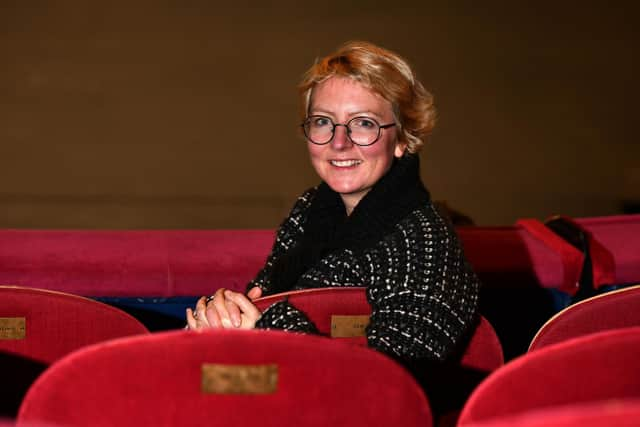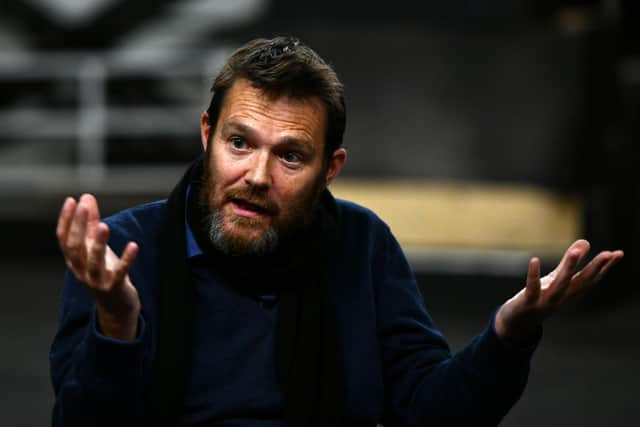2022 Arts preview: The Year Ahead in Theatre


January The Scottish theatre community enters the New Year in a strange, ambiguous frame of mind. Theatre folk are thrilled by the rush of live theatre that returned to our stages in the final months of 2021, but also distressed by the continuing divisions and inequalities highlighted by the pandemic, in an industry that often fails, in cash-strapped practice, to live up to its own best principles. Tensions mount further when Creative Scotland makes a surprise January announcement that, in future, every live theatre show backed by Creative Scotland must also be streamed online, to guarantee greater inclusion for those unable to make it to live events; the idea that theatre as we know it might be intrinsically exclusive and inaccessible sends shock-waves through the community, although a mere glance at prevailing theatre ticket prices suggests that it must, indeed, be so.
February At the Lyceum press night of Zinnie Harris’s new play A Scent Of Roses, all seems to be going smoothly with the “blended” presentation of the show, live and on Zoom, until a fire alarm tips the cast and live audience out into a wet night on Grindlay Street. The audience at home, cosily tucked up on the sofa and accidentally unmuted, begins to cackle with unkind laughter, prompting fears that audiences may give up winter theatre-going altogether.
Advertisement
Hide AdMarch Despite mounting dismay on all fronts, Scottish theatre plunges into a feverishly busy spring season. Matthew Lenton of Vanishing Point – a passionate advocate of live theatre as a unique experience – launches a tour of his acclaimed version of Kafka’s The Metamorphosis, one of the last major shows to open in Scotland before the pandemic in 2020. A tense public debate ensues about whether artists should have the freedom to refuse to be live-streamed, if they wish; but the question remains unresolved, despite passionate post-show discussions at the Tron and Traverse. Meanwhile, at the launch in the Beacon Arts Centre, Greenock, of a new Scottish musical about the life of Lena Zavaroni – called simply Lena – the online audience can be heard singing along with her hit songs, in a way that seems strangely moving.


April At the SECC in Glasgow, the National Theatre of Scotland stages the premier of Douglas Maxwell’s musical stage version of the hard-hitting Peter Mullan film Orphans. Thanks to Mullan’s stellar performance in the hugely popular NTS Scenes For Survival film Fat Baws – made during lockdown, and also written by Maxwell – Orphans becomes Scotland’s most successful live-streamed theatre show ever; and the NTS enjoys a boost in its public profile unparalleled since the launch of Black Watch, back in 2006.
May Wind and rain; many complaints that companies cannot get on with staging outdoor shows, which are mysteriously exempt from the compulsory live-stream ruling.
June The Lyceum’s revival of Tom McGrath’s much-loved play Laurel And Hardy becomes a surprise online hit, attracting a huge worldwide audience of Stan and Ollie fans. Meanwhile, Pitlochry Festival Theatre and Capital Theatres, Edinburgh, launch their new music theatre partnership with a touring production of Stephen Greenhorn’s Proclaimers tribute show Sunshine On Leith. Online interest is scanty, given that the show already exists as a film; but the live show is a roaring success, both in Pitlochry an on tour.
July Summer holidays; Scotland’s theatre community intellectually and aesthetically exhausted, not to say bamboozled. Mull Theatre launches Joseph Wilde’s new play In The Weeds, about the mounting pressures on rural and coastal communities, which involves flooding the stage; Creative Scotland grants the tour an exemption from the live-streaming rule, on the grounds that online audiences could not possibly enjoy the full experience of sharing a space with thousands of gallons of cold water.


August and September Sudden two-month shutdown of theatres following the emergence of new Covid variants, although fortunately they turn out to be mild. The Edinburgh Festivals are scuppered again, provoking anxious debate about the future of international arts in an age of uncertain travel and mounting climate concerns; but Pitlochry Festival Theatre is allowed to open its outdoor production of David Greig’s new play Under Another Sky, based on Charlotte Higgins’s book about the Romans in Britain.
Advertisement
Hide AdOctober The newly refurbished Citizens’ Theatre opens with a gorgeous revival of Robert David MacDonald’s Chinchilla, an astonishing play about art and artists, and why they might matter. Artistic director Dominic Hill declares that there is more to access than online streaming, and decides that the key to inclusion is to slash prices. The new Citizens’ therefore has the words “all seats 50p” emblazoned on every wall visible from the street; elderly theatregoers swear that they have seen something like this before, but legendary Citizens’ director Giles Havergal, guest of honour at the gala opening, only smiles and says nothing.
November Mist and sleet. Creative Scotland lifts its live-streaming rule in time for the pantomime season, on grounds of creative freedom; but says that it hopes companies have learned something from the experience.
Advertisement
Hide AdDecember Bright, crisp weather; and everything seems almost back to normal, as crowds gather for the gala opening of Beauty And The Beast at the Glasgow King’s. As stars Elaine C. Smith and Johnny Mac take to the stage, though, a faint third echo can be heard behind the traditional audience roars of “hiya” and “behind you”. And yes, it is the online audience, out there in the ether; the ones who cannot be there, yet still want to be with us, in the theatrical moment – and who, in a changed world, can never again be entirely forgotten, or left out in the dark, beyond the theatre door.


Every show named above will take place at the time and place mentioned, except for the Citizens’ reopening production of Chinchilla, which is my invention. All other details are entirely fictional, drawn from the depths of Mystic McMillan’s crystal ball.
A message from the Editor:
Thank you for reading this article. We're more reliant on your support than ever as the shift in consumer habits brought about by coronavirus impacts our advertisers.
If you haven't already, please consider supporting our trusted, fact-checked journalism by taking out a digital subscription at https://www.scotsman.com/subscriptions